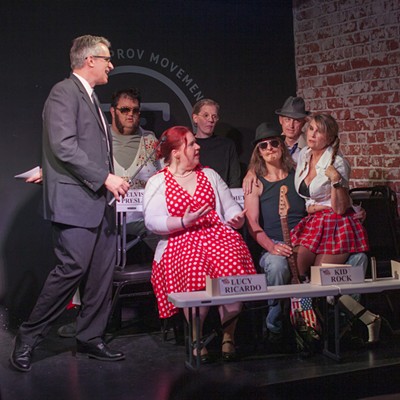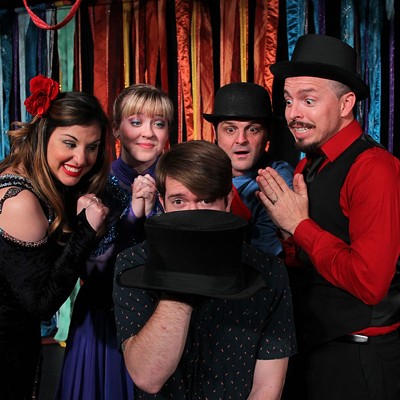Live Theatre Workshop continues to impress with its selection of plays that are well written, have enough substance to make us a bit thoughtful and utilize the theater's resources well. The latest effort is a very traditionally imagined script by Jeff Baron called Visiting Mr. Green, featuring two very likable characters who meet each other in quiet circumstances that grow in volume as they get to know each other.
Ross (Steve Wood) is a young professional approaching 30 who is assigned community service hours as a result of a traffic mishap. While driving a bit too fast, he almost hits an elderly man who steps out in front of him. The judge assigns him a weekly visit to this older gent, Mr. Green (David Alexander Johnston), to offer his help if any is needed, and to provide a bit of company, which it has been determined Mr. Green lacks.
Mr. Green, a slow-moving but sharp 86, is not too keen on the idea; in his mind he needs no help or company. The two get off to a rocky start but slowly begin to find some common ground. They are both Jewish, but Mr. Green, who has known his share of persecution and keeps a kosher house, is suspicious of Ross' grip on his Jewish identity. When Ross reveals his homosexuality, and his torment over what he feels is his need to be closeted, their relationship becomes more strained. The complications grow when Mr. Green reveals facts about his behavior toward his own family that Ross understands may be part of Jewish orthodoxy, but are certainly not what he understands to be the actions of a loving family man.
Rhonda Hallquist directs with a light touch, allowing her experienced actors to discover and develop a credibly caring relationship. This is particularly laudable because the tale could easily devolve into soppy sentimentality. She has handled the technical aspects of the production well, and she orchestrates the action so that it moves smoothly despite an abundance of short scenes requiring transitions, which tend to break the momentum.
Wood and Johnston work well together, and each has developed solid characterizations. We feel for Ross' shame and humiliation as he struggles to be true to himself while maintaining favor with his family. And we feel for Mr. Green, who has sacrificed his own happiness—and much needed comfort in his advancing years—by actions that seem less understandable to him as his tentative relationship with Ross grows. Johnston, in particular, gives a masterful performance portraying a man a few decades his senior. He successfully avoids an approach that could easily read as a curmudgeonly caricature, and gives us a very real character.
This is a well-wrought piece, engaging and heartfelt. Kudos to the crew at LTW.
A sizable experiment is in progress at Beowulf Alley Theatre Company, where, under the direction of Whitney Morton, actresses Lisa Mae Roether and Martie van der Voort are working on a reincarnation of a show called Parallel Lives, which was developed by actress/comedians Kathy Najimy and Mo Gaffney back in the '80s.
I call it an experiment because it seems still very much in development rather than a polished piece of theater. Awkward treatment of some great, though perhaps dated, material prevents the experiment from being conclusively deemed a success.
This is less a play than a series of scenes or vignettes, with the two actresses playing a couple of handfuls of characters. It's good-natured, though not without a bite or a snarl from time to time. It sends up dating at Denny's and "womyn's" consciousness-raising and Catholic-school girls. It gives us a look at sisters who realize they love each other but don't really like each other, and that that's all right. And we get an imaginative look at how haphazardly the rules of the world, especially regarding gender roles, came to be imposed. The material is both funny and poignant.
This type of theater is difficult stuff. An actor doesn't have the luxury of character development aided by defining costumes and the passing of time as a story is told. That challenge is hard enough. But, here, in a moment, a character must appear spontaneously and fully recognizable to us, only to be replaced with another fully formed character in the next moment. This takes highly developed skills, especially the ability to command the essence of the character's personality in an instant physical embodiment. Maybe a prop or a costume piece can help, but pretty much, body and voice are the only tools. And it was clear these tools were not always at the actors' command.
It's likely that Najimy and Gaffney used improvisation as they developed the show, and this production seems to rely on a bit of improvisation within some of the scenes; or at least it seemed they were not always using scripted words. But this is hard to pull off, too. The action and dialogue must be clean and crisp to launch the comedy inherent in any given moment, and that was too often missing here. (It also made the evening longer than it needs to be.) Even changes between the scenes were not always clear. The result was more muddle than magic.
Roether has done the show before, so maybe that explains her greater facility with the material. But both actresses work hard and earnestly with a highly challenging piece, and the small audience truly seemed to enjoy their efforts.










